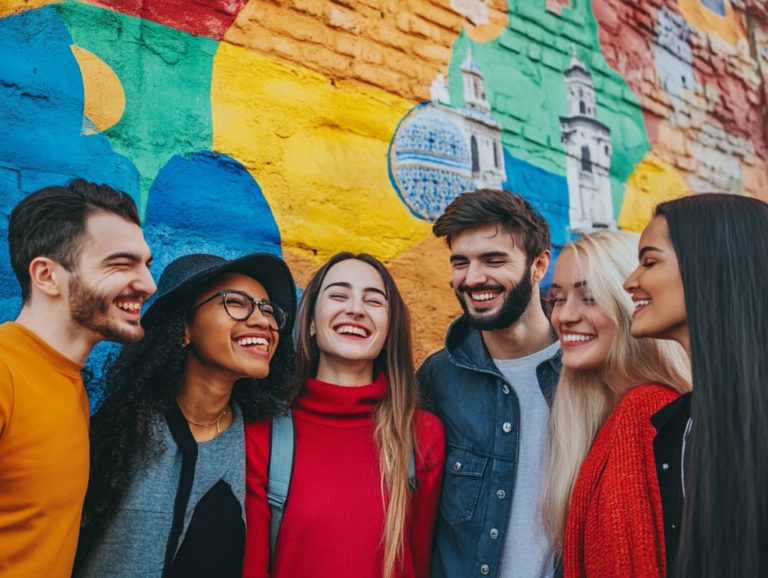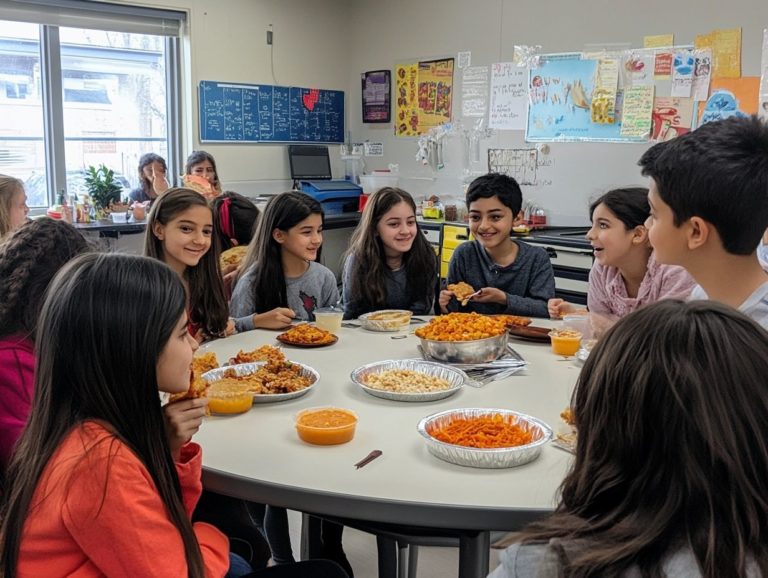How to Stay Culturally Engaged While Studying
Studying in a new environment offers you a remarkable opportunity for both academic growth and personal development through cultural engagement.
When you embrace diverse cultures, your educational experience becomes richer, fostering meaningful connections and enhancing your overall well-being. This article delves into the numerous benefits of cultural engagement, providing you with practical strategies to immerse yourself in different communities while addressing the challenges you might encounter along the way.
Engaging with new cultures helps you adapt quickly and thrive! It can positively influence your mental health, helping to alleviate feelings of isolation or homesickness. Discover how remaining culturally engaged can truly transform your academic journey!
Contents
- Key Takeaways:
- The Importance of Cultural Engagement while Studying
- Ways to Stay Culturally Engaged
- Challenges and Solutions for Cultural Engagement
- The Impact of Cultural Engagement on Mental Health
- Frequently Asked Questions
- What is cultural engagement while studying?
- Why is it important to stay culturally engaged while studying?
- How can I stay culturally engaged while studying?
- What are the benefits of staying culturally engaged while studying?
- Can staying culturally engaged while studying improve my academic performance?
- Are there any potential challenges of staying culturally engaged while studying?
Key Takeaways:
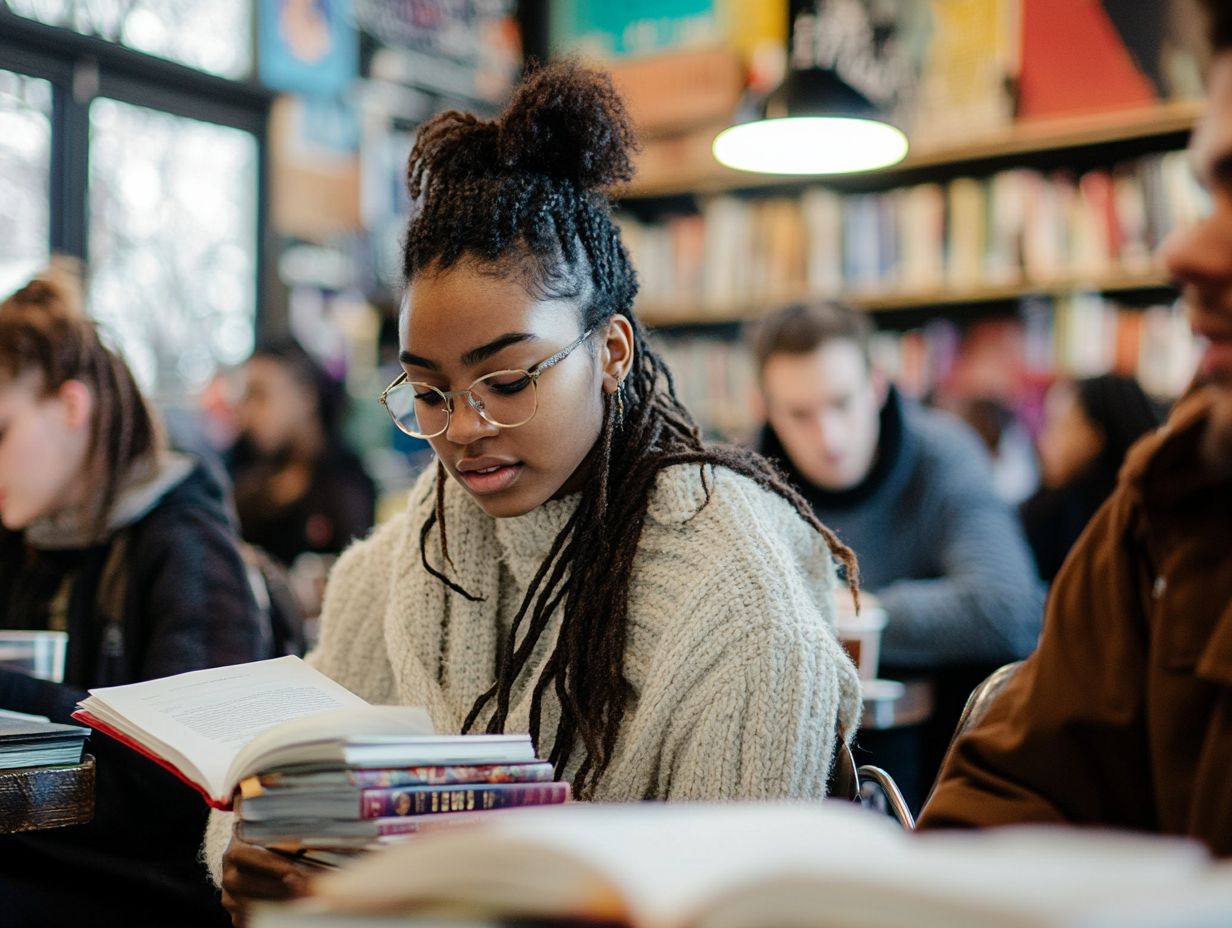
- Engaging with culture while you study boosts your personal growth and helps you succeed academically.
- Join cultural clubs, attend events, and connect with diverse communities to stay culturally engaged.
- Overcome challenges like language barriers and cultural differences to immerse yourself fully in the experience.
The Importance of Cultural Engagement while Studying
Cultural engagement is essential for enriching your study abroad experience. It cultivates the ability to understand and communicate with people from different cultures and fosters meaningful interactions with students from diverse backgrounds.
Whether you find yourself in Italy, Japan, South Africa, or the U.S., you ll have unique opportunities to explore local customs and immerse yourself in the local food culture.
This engagement not only helps you adapt but also enhances your academic success. Navigating these experiences can significantly ease culture shock the confusion and stress you might feel when adjusting to a new culture and homesickness, creating a well-rounded educational environment that prepares you for global citizenship.
Benefits for Personal Growth and Academic Success
Engaging in cultural activities while studying abroad plays a crucial role in your personal growth and academic success. It allows you to gain valuable insights into cultural norms.
This immersive journey enhances your adaptability and equips you with essential life skills. For instance, if you’re a student from the U.S. studying in Japan, participating in a traditional tea ceremony can deepen your appreciation for respect and patience traits beneficial in academic settings and future workplaces.
Consider international students forming a study circle that celebrates their diverse backgrounds. This collaboration fosters improved teamwork and open-mindedness as you tackle complex projects together. These enriching experiences significantly contribute to your personal development and academic performance.
Ways to Stay Culturally Engaged
You can enhance your study abroad experience by immersing yourself in the local culture through a variety of activities that promote community involvement.
Consider joining cultural clubs, exploring the local food scene, and participating in vibrant cultural celebrations. Each of these experiences not only enriches your time abroad but also connects you deeply with the culture around you.
Joining Cultural Clubs and Organizations
Joining cultural clubs and organizations is an excellent way for you to immerse yourself in the local community, facilitating engagement and cultural adaptation through shared experiences.
By actively participating in these groups, you can build valuable connections with locals and fellow students, opening doors to networking opportunities that significantly enhance your personal and professional growth.
For example, if you find yourself in Italy, consider joining ‘Club Italia’ to dive into the world of Italian art, cuisine, and language. In Japan, you might discover ‘Nihon no Kai’ as the perfect avenue to explore traditional practices and meet Japanese peers.
Similarly, in South Africa, the ‘Ubuntu Society’ provides a fantastic opportunity to celebrate diverse cultures while learning about the nation s rich history. This makes cultural clubs a critical part of the expat experience, enriching your journey in countless ways.
Attending Cultural Events and Festivals

Attending cultural events and festivals presents you with exceptional opportunities to immerse yourself in local customs. These experiences create meaningful memories that elevate your study abroad journey!
For instance, join the vibrant Holi festival in India! It’s a riot of colors and joy, offering a chance to forge connections through shared happiness and the symbolism of renewal.
Similarly, joining the Carnival in Brazil can be a thrilling adventure. Here, music, dance, and rich folklore converge, helping you cultivate friendships and gain a profound understanding of the local social fabric.
These interactions enhance your cultural appreciation while encouraging you to contribute to the lively atmosphere, transforming your international experience into something truly holistic and unforgettable.
Engaging with Diverse Communities
Engaging with diverse communities is essential for nurturing meaningful interactions. It enriches your cultural engagement and enhances your global learning during your study abroad experience.
By actively volunteering in local organizations or participating in community events, you not only offer support but also gain invaluable insights into different cultural perspectives.
Building relationships with locals opens doors to authentic exchanges, allowing you to develop a deeper understanding of their traditions and values. These experiences significantly contribute to your personal growth, challenging your preconceived notions and broadening your horizons!
Engaging in cultural exchanges fosters a sense of belonging, encouraging open dialogue and mutual respect elements that are vital for a well-rounded international experience.
Let s explore some challenges you might face
Challenges and Solutions for Cultural Engagement
While cultural engagement presents a wealth of benefits during your study abroad journey, you may encounter various challenges.
Language barriers can create obstacles in communication. Culture shock, the feeling of confusion or anxiety when adapting to a new culture, can cause confusion during your adventure!
Overcoming Language Barriers
Overcoming language barriers is essential for enhancing your communication and facilitating cultural adaptation. This ultimately leads to more enriching experiences during your study abroad program.
By employing various techniques, you can significantly improve your language skills and connect more deeply with your surroundings. Engaging in language exchange programs allows for dynamic interactions with native speakers, offering both you and your conversation partner a chance to learn and grow.
Utilizing academic resources, such as language labs or study groups, provides you with structured learning opportunities that can boost your progress. Practicing with locals not only increases your confidence but also fosters authentic relationships, enriching your immersion experience!
Throughout this journey, embracing patience and persistence is key, as mastering a new language takes time and practice but the rewards are undeniably transformative.
Navigating cultural differences is vital for you to cultivate an understanding of other cultures and grasp cultural norms while being mindful of privilege and cultural biases that may surface.
Engaging with diverse cultures often calls for you to approach interactions with an open mind. This paves the way for genuine connections and invaluable learning experiences.
Embracing self-awareness is key, prompting you to reflect on your own background and perspectives. By recognizing your own biases, you enable yourself to adapt more effectively to new environments, fostering meaningful exchanges.
This reflective practice enhances your ability to appreciate a variety of viewpoints, enriching both your educational journey and personal growth in a multicultural world.
Don t miss out on local festivals! Get involved and experience the culture firsthand!
Cultural experiences shape your journey, making it unforgettable!
The Impact of Cultural Engagement on Mental Health
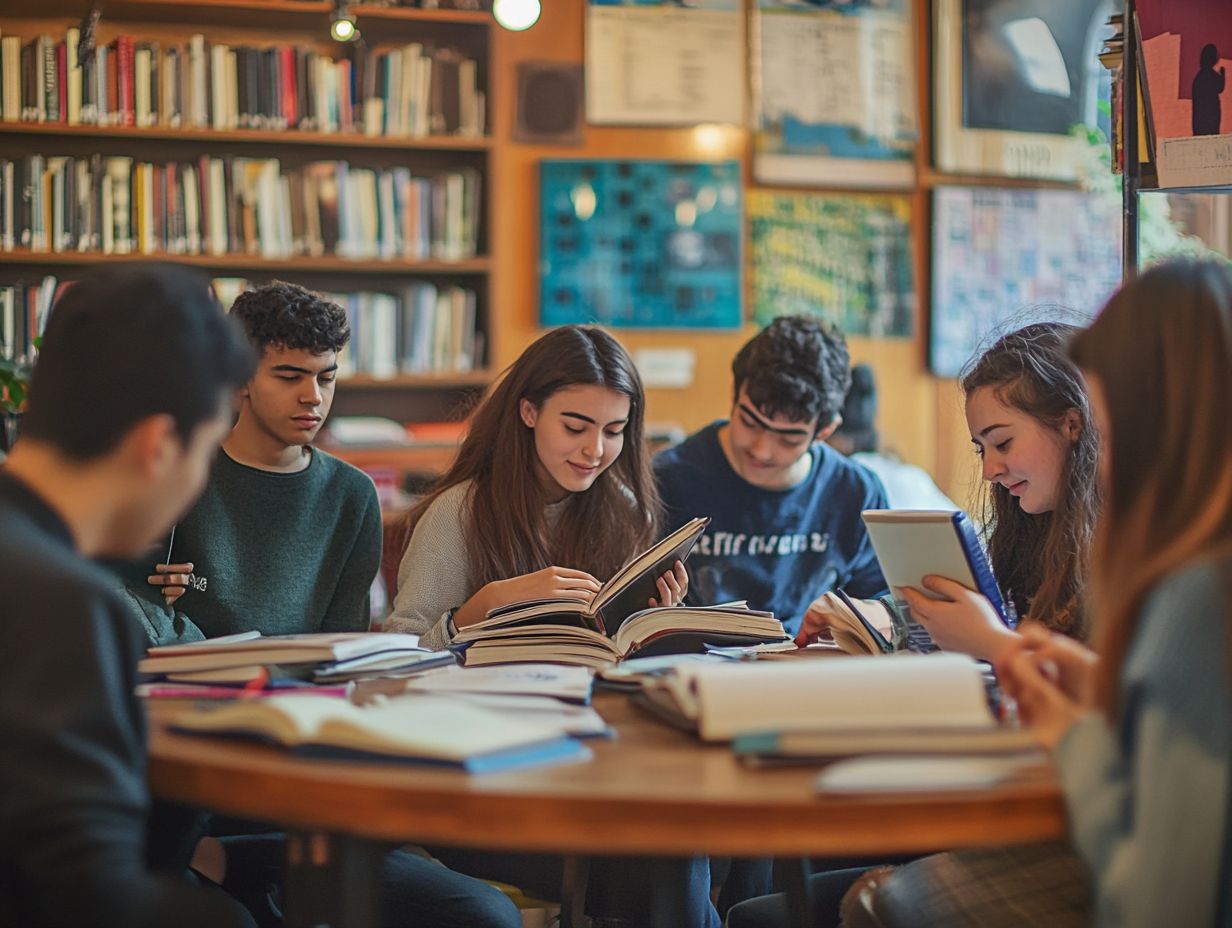
Cultural engagement plays a vital role in your mental health. It helps alleviate feelings of isolation and homesickness.
By immersing yourself in the local culture, you foster a sense of community involvement. This can significantly enhance your study abroad experience, making it more enriching and fulfilling.
Addressing Isolation and Homesickness
Addressing feelings of isolation and homesickness is crucial for ensuring a positive study abroad experience. Cultural engagement can be a powerful tool for building community support.
Immerse yourself in the local culture to forge connections that help ease loneliness. Participate in cultural events, workshops, and local meetups. These activities sharpen your language skills and bridge the gap between you and the community.
Engage in group activities like joining clubs or volunteer organizations. This allows you to meet like-minded peers and cultivate a sense of belonging. Don t forget to reach out for help when homesickness becomes overwhelming.
Establishing friendships with locals and fellow students can create a strong support network. This makes the transition smoother and enriches your overall experience abroad.
Finding Support and Connection
Finding support and connection during your study abroad experience is essential for your personal well-being. Engaging in cultural activities leads to meaningful interactions that blossom into lasting friendships.
These activities offer a fantastic opportunity to bond with others who share your interests and backgrounds. Connecting with peers can be as simple as joining a local climbing club, attending cooking classes, or participating in language exchange meetups.
Many cities warmly embrace newcomers through cultural festivals, art exhibits, and music events. Engaging in initiatives like community gardens or food co-ops encourages teamwork and allows you to meet locals while working towards a shared goal.
Such experiences enhance your social skills and deepen your cultural understanding. This paves the way for a fulfilling study abroad journey.
Frequently Asked Questions
What is cultural engagement while studying?
Cultural engagement means getting involved with and learning about different cultures while studying.
Why is it important to stay culturally engaged while studying?
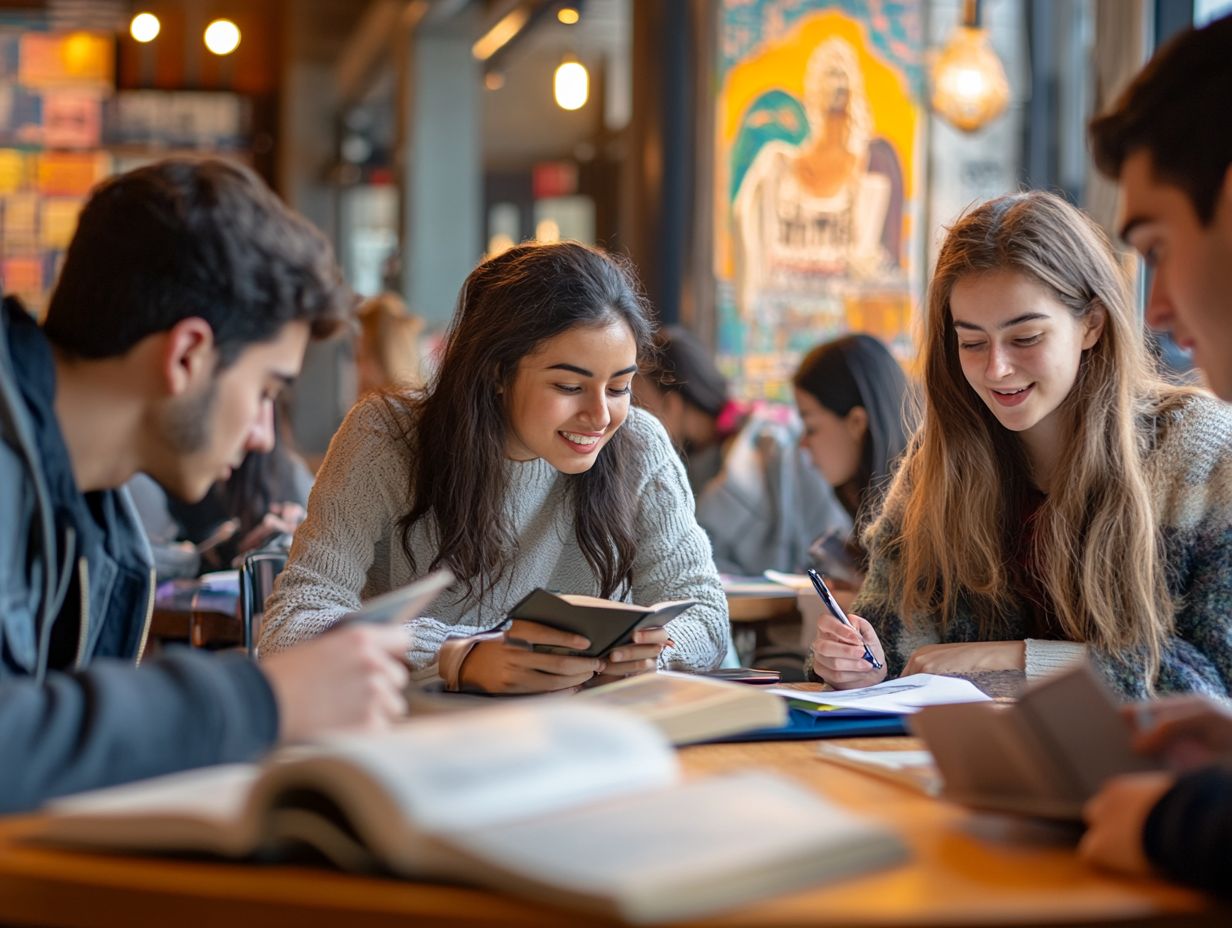
Staying culturally engaged while studying helps broaden your perspective. It fosters critical thinking and promotes a deeper understanding and appreciation of diverse cultures.
How can I stay culturally engaged while studying?
You can stay culturally engaged by joining cultural clubs or organizations, attending cultural events and festivals, taking courses on cultural studies, and actively seeking opportunities to interact with people from different cultures.
What are the benefits of staying culturally engaged while studying?
Staying culturally engaged helps develop empathy, communication skills, and global awareness. These skills are valuable in today’s interconnected world.
Can staying culturally engaged while studying improve my academic performance?
Yes! Staying culturally engaged can improve academic performance by enhancing critical thinking skills, promoting a more diverse learning environment, and exposing students to new perspectives and ideas.
Are there any potential challenges of staying culturally engaged while studying?
Some challenges may include language barriers, cultural differences, and misunderstandings. However, these challenges can also serve as opportunities for growth and learning.

